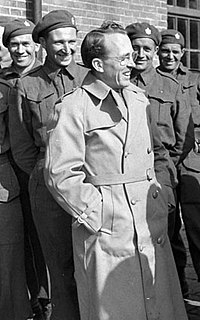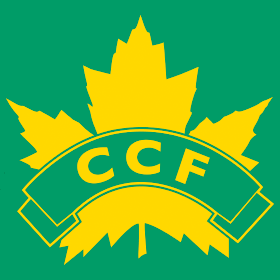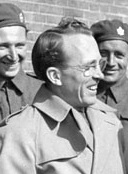The Saskatchewan general election of 1960 was the fourteenth provincial election held in the Canadian province of Saskatchewan. It was held on June 8, 1960, to elect members of the Legislative Assembly of Saskatchewan.

The provinces and territories of Canada are the sub-national governments within the geographical areas of Canada under the authority of the Canadian Constitution. In the 1867 Canadian Confederation, three provinces of British North America—New Brunswick, Nova Scotia, and the Province of Canada —were united to form a federated colony, becoming a sovereign nation in the next century. Over its history, Canada's international borders have changed several times, and the country has grown from the original four provinces to the current ten provinces and three territories. Together, the provinces and territories make up the world's second-largest country by area.

Saskatchewan is a prairie and boreal province in western Canada, the only province without natural borders. It has an area of 651,900 square kilometres (251,700 sq mi), nearly 10 percent of which is fresh water, composed mostly of rivers, reservoirs, and the province's 100,000 lakes.

The Legislative Assembly of Saskatchewan is one of two components of the Legislature of Saskatchewan, the other being the Queen of Canada in Right of Saskatchewan,. The legislature has been unicameral since its establishment; there has never been a provincial upper house.
The Co-operative Commonwealth Federation of Thomas C. Douglas campaigned promising a Medicare, a public medical plan for all of Saskatchewan, and it was re-elected with a slightly increased majority. The CCF won despite opposition from the College of Physicians and Surgeons, which told voters that Medicare would take freedom of choice away from patients and would cause doctors to leave the province.
The Saskatchewan New Democratic Party (NDP) is a social-democratic political party in the Canadian province of Saskatchewan. It currently forms the official opposition, but has been a dominant force in Saskatchewan politics since the 1940s. The party is the successor to the Saskatchewan section of the Co-operative Commonwealth Federation (CCF), and is affiliated with the federal New Democratic Party.
Medicare is an unofficial designation used to refer to the publicly funded, single-payer health care system of Canada. Canada does not have a unified national health care system; instead, the system consists of 13 provincial and territorial health insurance plans that provides universal health care coverage to Canadian citizens, permanent residents, and certain temporary residents. These systems are individually administered on a provincial or territorial basis, within guidelines set by the federal government. The formal terminology for the insurance system is provided by the Canada Health Act and the health insurance legislation of the individual provinces and territories.
A year later, Douglas passed legislation making Saskatchewan the first province in Canada to have Medicare. The same year, Douglas resigned as leader of the CCF to become leader of the federal New Democratic Party.
Campaigns
In addition to the elections campaigns led by the four main political parties, the College of Physicians and Surgeons launched a full-scale campaign against Medicare.
CCF
The Saskatechewan CCF, led by Douglas, proposed "a province-wide medical care program." Douglas assured voters that the only thing that would change about the medical system would be that the doctor would bill the medical care plan instead of billing the patient. The CCF won the election, with 37 seats, one more than in the previous election in 1956.
Progressive Conservatives
The Progressive Party of Saskatchewan, led by Martin Pederson, a 38-year-old farmer, won considerable support in the cities (Regina and Saskatoon), but they were not able to win any seats in the legislature. The 15 federal Progressive Conservative Members of Parliament from Saskatchewan campaigned for the provincial party. The main issue for the party was not Medicare but farm prosperity. It promised farmers grant of a $1 per acre ($247/km²) from the province, with a maximum of $100. It claimed that this program would be made possible by assistance from the federal government of Prime Minister John Diefenbaker, from Saskatchewan himself and a former leader of the Saskatchewan PCs. On Medicare, it only proposed a Royal Commission.
The Progressive Party of Saskatchewan was a provincial section of the Progressive Party of Canada and was active from the 1920s to the mid-1930s. The Progressives were an agrarian, social democratic political movement originally dedicated to political and economic reform and challenging economic policies that favoured the financial and industrial interests in Central Canada over agrarian and to some extent labour interests. Like its federal counterpart it favoured free trade over protectionism.
Martin Pederson was a Canadian farmer, business owner and politician, who was leader of the Progressive Conservative Party of Saskatchewan from 1958 to 1968.

Regina is the capital city of the Canadian province of Saskatchewan. The city is the second-largest in the province, after Saskatoon, and a cultural and commercial centre for southern Saskatchewan. It is governed by Regina City Council. The city is surrounded by the Rural Municipality of Sherwood No. 159.
Liberals
The Liberal Party of Saskatchewan, led by Ross Thatcher of Moose Jaw, claimed that Pederson's promise of land payments was tantamount to bribery. It won 17 seats, and formed the official opposition. Thatcher, a former member of the CCF, was concerned about the economic problems in the province. He was neutral on Medicare and stated that it would be up to the people of Saskatchewan to decide whether or not the province would implement it. The party was also in favour of pre-paid medical insurance.
The Liberals were concerned that the economic development of Saskatchewan had lagged behind the rest of Canada during the Douglas era. They were also concerned about the proposed merger of the CCF and the Canadian Labour Congress, which later led to the formation of the New Democratic Party.
Social Credit
The Social Credit Party of Saskatchewan was led by the 38-year-old Martin Kelln, who had strong views about monetary reform and the social credit movement, and was viewed by many as a serious threat to the ruling CCF government. However, the party was unable to win any seats. It was the only party openly opposed to Medicare.
College of Physicians and Surgeons
The College of Physisicans and Surgeons ran a campaign against Medicare. Almost all doctors in Saskatchewan were against it, and many had pamphlets available in their offices. The College paid for anti-Medicare ads in newspapers and on television. The College used scare tactics to frighten the public by claiming, for example, that patients would just be numbers and that patients would be assigned new doctors based on their names or that the government would be able to pass on medical secrets of patients.

Thomas Clement Douglas was a Canadian politician who served as Premier of Saskatchewan from 1944 to 1961 and Leader of the New Democratic Party from 1961 to 1971. A Baptist minister, he was elected to the House of Commons of Canada in 1935 as a member of the Co-operative Commonwealth Federation (CCF). He left federal politics to become Leader of the Saskatchewan Co-operative Commonwealth Federation and then the seventh Premier of Saskatchewan. His cabinet was the first social democrat government in North America and it introduced the continent's first single-payer, universal health care program.

The Saskatchewan Party is a conservative, centre-right political party in the Canadian province of Saskatchewan. Since 2007, it has been the province's governing party, currently led by Premier Scott Moe. The party was established in 1997 by a coalition of former provincial Progressive Conservative and Liberal party members and supporters who sought to remove the Saskatchewan New Democratic Party (NDP) from power.
Wilbert Ross Thatcher, was the ninth Premier of Saskatchewan, Canada, serving from May 2, 1964 to June 30, 1971.

The Saskatchewan Liberal Party is a centre-right political party in the Canadian province of Saskatchewan.

The Progressive Conservative Party of Saskatchewan is a right-of-centre political party in the Canadian province of Saskatchewan. Prior to 1942, it was known as the Conservative Party of Saskatchewan. Members are commonly known as Tories.

The Alberta New Democratic Party, commonly shortened to Alberta NDP, is a social-democratic political party in Alberta, Canada, which succeeded the Alberta section of the Co-operative Commonwealth Federation and the even earlier Alberta wing of the Canadian Labour Party and the United Farmers of Alberta. From the mid-1980s to 2004, the party abbreviated its name as the "New Democrats" (ND).

Woodrow Stanley Lloyd was a Canadian politician and educator. Born in Saskatchewan in 1913, he became a teacher in the early 1930s. He worked as a teacher and school principal until 1944, and was involved with the Saskatchewan Teachers' Federation, eventually becoming its president.

Allan Emrys Blakeney was the tenth Premier of Saskatchewan from 1971 to 1982, and leader of the Saskatchewan New Democratic Party (NDP).

The Canadian federal election of 1962 was held on June 18, 1962 to elect members of the House of Commons of Canada of the 25th Parliament of Canada. When the election was called, Progressive Conservative (PC) Prime Minister John Diefenbaker had governed for four years with the then-largest majority in the House of Commons in Canadian history.

The Cooperative Commonwealth Federation (Manitoba) (CCF), known informally as the Manitoba CCF, was a provincial branch of the national Canadian party by the same name. The national CCF was the dominant social-democratic party in Canada from the 1930s to the early 1960s, when it merged with the labour movement to become the New Democratic Party. The Manitoba CCF, created in 1932, played the same role at the provincial level.
Lloyd Cleworth Stinson was a politician in Manitoba, Canada, and the leader of that province's Co-operative Commonwealth Federation (CCF) from 1953 to 1959. Although widely regarded as a capable leader, he was unable to achieve a major electoral breakthrough for his party.

The Saskatchewan general election of 1944 was the tenth provincial election in the Canadian province of Saskatchewan. It was held on June 15, 1944 to elect members of the Legislative Assembly of Saskatchewan.

The Saskatchewan general election of 1964 was the fifteenth provincial election held in the Canadian province of Saskatchewan. It was held on April 22, 1964, to elect members of the Legislative Assembly of Saskatchewan.

The Saskatchewan general election of 1967 was the sixteenth provincial election held in the Canadian province of Saskatchewan. It was held on October 11, 1967, to elect members of the Legislative Assembly of Saskatchewan.
The Social Credit Party of Saskatchewan was a political party in the Canadian province of Saskatchewan that promoted social credit economic theories from the mid-1930s to the mid-1970s.
Socialism in Canada has a long history and is, along with conservatism and liberalism, a political entity in Canada.
The Politics of Saskatchewan are part of the Canadian federal political system along with the other Canadian provinces. Saskatchewan has a Lieutenant-Governor, Vaughn Solomon Schofield, who is the representative of the Crown in Right of Saskatchewan, an elected premier, Scott Moe, leading the Cabinet, and a unicameral legislature.
The Saskatchewan doctors' strike was a 23-day labour action exercised by medical doctors in 1962 in the Canadian province of Saskatchewan in an attempt to force the Co-operative Commonwealth Federation government of Saskatchewan to drop its program of universal medical insurance. The strike was from July 1, the day the Saskatchewan Medical Care Insurance Act took force, to July 23.
The New Democratic Party is a social democratic federal political party in Canada. The party was founded in 1961 out of the merger of the Co-operative Commonwealth Federation (CCF) with the Canadian Labour Congress (CLC). The party sits to the left of the Liberal Party of Canada within the Canadian political spectrum. The leader of the federal NDP is Jagmeet Singh, who won the 2017 leadership election.














